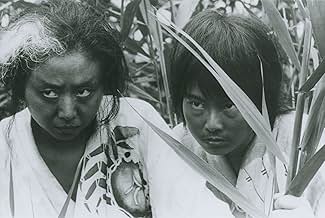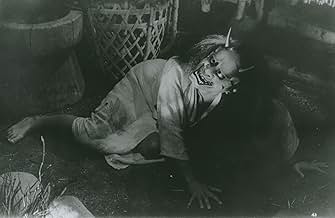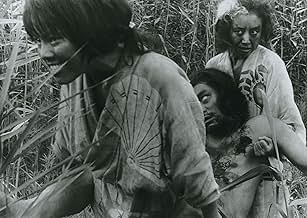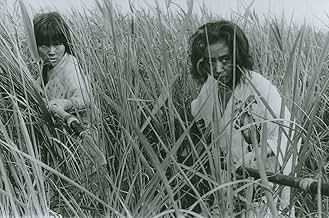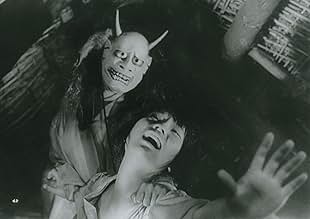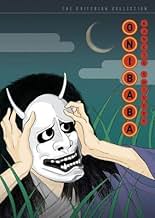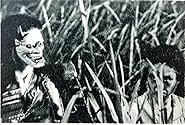Two women kill samurai and sell their belongings for a living. While one of them is having an affair with their neighbor, the other woman meets a mysterious samurai wearing a bizarre mask.Two women kill samurai and sell their belongings for a living. While one of them is having an affair with their neighbor, the other woman meets a mysterious samurai wearing a bizarre mask.Two women kill samurai and sell their belongings for a living. While one of them is having an affair with their neighbor, the other woman meets a mysterious samurai wearing a bizarre mask.
- Awards
- 2 wins
- Director
- Writer
- All cast & crew
- Production, box office & more at IMDbPro
Storyline
Did you know
- TriviaOnibaba's literal meaning is demon hag or old devil woman.
- GoofsThe orientation of how Hachi holds his spear while talking to the young woman and the old woman changes from cut to cut. At times he has his arm extended and other times his elbow is bent.
- Alternate versionsOriginally cut in England when released in 1968, though the video releases are uncut.
Featured review
Onibaba is a very well done film, purposefully using black and white cinema to its' advantage in this stunning portrayal of murder, jealousy, and uncontrollable human instinct in a dark period of Japan's history.
A film that aims at portraying the baser side of human nature and investigating human psychology, it is chalk-full of symbolic scenes and sequences. From start to finish it draws you in with the odd imagery and scenery of Japan's rural areas, and even though in this film though there are very few characters and elements that are to it, both visually and literally, through its' minimalism it effectively tells its' story.
This film is both very artistic & symbolic as well as literal and upfront, juxtaposing very graphic, real images of the face of humanity that demand the viewer to infer much throughout the whole of the film. When going into this film, I would say that it is very important for the viewer to think of the film as being very symbolic for the instincts and base nature of mankind, and perhaps even a 'state of nature' portrayal of humanity. If you watch this film with that in mind, it will help with the inferences that one must make to get the most out of this film.
As it stands by itself, aside from the deeper meaning, it is an intriguing story that is a veritable 'slice of life' film in the darker sense, viewing the way that people had to live during a period of war and hard times in feudal Japan. It deals with the hardships that these people face, and their method of survival, in addition to a very human story of jealousy and portrayal with a very interesting culminating point that I did not expect at all. The climax of the film is very much worth the build-up, though at times it seemed to be rather slow.
Overall, a very important piece of film when it comes to the symbolism and techniques employed. Through its' minimalism and black-and-white cinematography we are really treated to a great film that is, of its' own right, an influential and great movie. The cinematography is exceptionally good, especially the use of the reeds and the light at night.
I would recommend this film to anybody with a serious interest in film, as well as anybody who likes a good film that investigates the darker side of human nature.
A film that aims at portraying the baser side of human nature and investigating human psychology, it is chalk-full of symbolic scenes and sequences. From start to finish it draws you in with the odd imagery and scenery of Japan's rural areas, and even though in this film though there are very few characters and elements that are to it, both visually and literally, through its' minimalism it effectively tells its' story.
This film is both very artistic & symbolic as well as literal and upfront, juxtaposing very graphic, real images of the face of humanity that demand the viewer to infer much throughout the whole of the film. When going into this film, I would say that it is very important for the viewer to think of the film as being very symbolic for the instincts and base nature of mankind, and perhaps even a 'state of nature' portrayal of humanity. If you watch this film with that in mind, it will help with the inferences that one must make to get the most out of this film.
As it stands by itself, aside from the deeper meaning, it is an intriguing story that is a veritable 'slice of life' film in the darker sense, viewing the way that people had to live during a period of war and hard times in feudal Japan. It deals with the hardships that these people face, and their method of survival, in addition to a very human story of jealousy and portrayal with a very interesting culminating point that I did not expect at all. The climax of the film is very much worth the build-up, though at times it seemed to be rather slow.
Overall, a very important piece of film when it comes to the symbolism and techniques employed. Through its' minimalism and black-and-white cinematography we are really treated to a great film that is, of its' own right, an influential and great movie. The cinematography is exceptionally good, especially the use of the reeds and the light at night.
I would recommend this film to anybody with a serious interest in film, as well as anybody who likes a good film that investigates the darker side of human nature.
- jmverville
- Dec 8, 2004
- Permalink
- How long is Onibaba?Powered by Alexa
Details
- Runtime1 hour 43 minutes
- Color
- Sound mix
- Aspect ratio
- 2.35 : 1
Contribute to this page
Suggest an edit or add missing content



